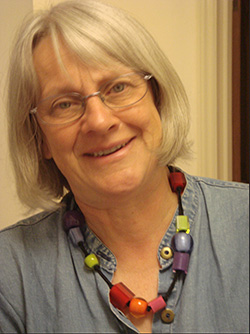
Anne Watson is Professor Emeritus of Mathematics Education at the University of Oxford, UK.
1. What’s your earliest memory of doing mathematics?
I remember being in class and having some small metal trays with slots in, with yellow and blue beads which were made to slide to and fro in the slots in some kind of relationship. I guess we used these to learn about number, but when I found one again recently in a junk shop I had no idea at all how it was supposed to be used!
2. How has mathematics education changed in the time you have been involved in it?
When I started teaching the secondary curriculum we included programming, incidence matrices, graph theory and polyhedra alongside the usual strands of development – and we used Geoff Giles' approach to algebra via function machines and manipulating shapes. Eventually I was involved with the Association of Teachers of Mathematics' 100% coursework GCSE – which in my opinion gave freedom for all learners to act mathematically rather than be told what to do and how to do it. I am not saying these were the good old days - there were too many students nationally not really getting anywhere with maths – but I am saying that these possibilities should not be forgotten.
3. Tell me about a time in your career when something totally flabbergasted you.
In an all-attainment class students were working on routes on a grid to generate binomial coefficients (how many ways to get from (0,0) to (a,b)?). This gives you Pascal's triangle if you turn it through 135 degrees clockwise. We were having a whole-class discussion about work-so-far and the only student who offered an explanation of how the total for (a,b) is related to the nearby totals was one who normally had very little to offer in mathematics and seemed to have huge gaps in his knowledge. It turned out that he had spent a lot of his infancy on allotments which were in a grid arrangement, so grids were home ground for him. This told me a lot about listening, about using spatial approaches to concepts, about not rushing to judgement about individuals, etc.
4. Do you practise mathematics differently in company?
I like to curl up in a corner to get started on a maths problem and I lose the thread if working with people who talk a lot about what they are doing and seeing in the early stages. But once I am past the initial step of finding my own way in I love the way the talkings and silences ebb and flow as people work on and share ideas.
5. Do you think a brilliant maths teacher is born or made?
I don't know – all the teachers from whom I learn about maths and how to teach it work very hard at their teaching and their maths. Unlike some I do not think the day-to-day work of teaching is 'performance’ – it is too exhausting to be so – but it is a way of being in which certain riffs become habits so that new riffs can be developed. Profound preparation is important; profound listening is important. Whether born or made these ingredients have to be there.
6. What’s the most fun a mathematician can have?
Showing off how to cut pizzas into n equal servings is thought by some to be fun. Listening to Tom Lehrer songs and getting the jokes is fun.
7. Do you have a favourite maths joke?
I am afraid that the earliest one I remember (from about 1960) is the one about the mathematician with constipation and I don't want to say the punchline in public. But you can find it on the internet. Or, I have twin daughters (I really do), one of them is 40 (she really is), how old is the other? (Answer: forty-too.)
Join the conversation: You can tweet us @CambridgeMaths or comment below.